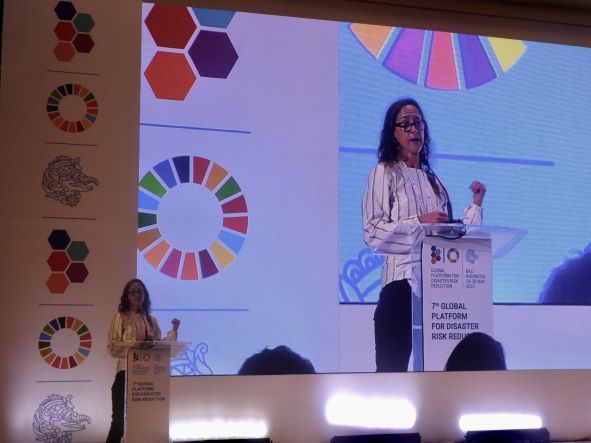
Introduction of the Walker Interactive Theatre at the UNDRR Global Platform for Risk Reduction, May 2022
The Walker Institute attended UNDRR’s Global Platform for Disaster Risk Reduction (GPDRR), GP2022 7th Session, Bali, Indonesia, 23-28 May 2022 and led an interactive theatre with stakeholders and partners from across the world. The GPDRR convenes to address multi-hazard early warning systems (MHEWS) and early action, with the 2022 session focusing on, ‘From Risk to Resilience: Towards Sustainable Development for All in a COVID-19 Transformed World’.
Interactive Theatre
On the 26th May, we enabled GP2022 participants to take part in an Interactive theatre In response to a direct invitation from The World Meteorological Organisation (WMO), who had previously having taken part as ‘Spect-actors’ in our session exploring Public/Private Partnerships for Climate Information Services at the Adaptation Futures Conference in Cape Town, based on a previous performance with Senegalese decision makers and practitioners on Adaptive Social Protection. The aim at GF2022 was to open dialogue around the challenges stakeholders are experiencing in implementing the Global Multi-Hazard Early Warning System (MHEWS) in diverse contexts. The theatre inspired lively discussion with the audience, who suggested changes to the narrative and steered the narrative in a new direction to address the challenges articulated in the script while the performance was taking place. The session was supported by WMO and climate experts from Indonesia. We continue to use Interactive Theatre in our risk and adaptation research as part of a systems-based approach to understanding place-based risk and quantify “My” Climate Risk as part of our work supporting the implementation of National Adaptation Plans (e.g. https://walker.reading.ac.uk/project/climate-adaptation-in-lao-pdr/).
What were the main conference discussion and conclusions?
Organized in a hybrid format, the Global Platform had over 4000 participants from a total of 185 countries. Progress towards gender parity and accessibility was evident throughout the platform. Half of the panellists and 40 percent of participants were women. Over 200 persons with disability actively engaged in panels and in discussion, doubling the number since the 2019 Global Platform. The Global Platform was organized at a time when the world is recovering from the COVID-19 pandemic, while facing the growing impacts of the climate emergency. This has been compounded by conflicts, including the war in Ukraine, which has disrupted global supply chains, led to inflation, and threatened food security, further deepening vulnerabilities of people living in the most disaster-prone parts of the world.
Discussions at the conference at multiple sessions pointed to similar conclusions: that early warning/ early action remains a challenge for many around the world: in particular, across the Global South and for small island nations. Discussions focused on pervasive data gaps; funding gaps and how to close them; public-private partnerships; business models and sustainability; ‘leave no one behind’ with a focus on women, marginalised communities and people with disabilities; the warning versus action gap and opportunities to scale up successful pilot programmes. There was also an emphasis on the role of the arts (theatre, dance, poetry, music and beyond) in communicating with communities successfully.
The seventh session of the Global Platform for Disaster Risk Reduction took place from 25 to 27 May 2022 in Bali, Indonesia. It was co-chaired by H.E. Prof. Muhadjir Effendy, Coordinating Minister for Human Development and Cultural Affairs of the Republic of Indonesia, and Ms. Mami Mizutori, Special Representative of the United Nations Secretary-General for Disaster Risk Reduction.
The theme of the Global Platform, “From Risk to Resilience: Towards Sustainable Development for All in a COVID-19 Transformed World”, offered lessons from the pandemic and pathways to address the climate emergency. The Global Platform underscored urgent actions necessary to accelerate efforts to bring the world on track to achieving the goals of the 2030 Agenda for Sustainable Development and the Sendai Framework for Disaster Risk Reduction. The President of Indonesia, as the host of the Global Platform, encouraged the international community to enhance cooperation in disaster risk management through collaboration towards sustainable resilience based on the principles of strengthened risk reduction culture and education; investment in science, technology and innovation; climate and disaster resilient infrastructure; and implementation of global commitments. In the current global recovery, and in line with Indonesia’s G20 Presidency under the theme “Recover Together Recover Stronger,” the Global Platform provided a unique and timely opportunity to showcase the importance and value of inclusive and networked multilateralism, international solidarity and cooperation.
The Global Platform was preceded, on 23 and 24 May 2022, by the Third Multi Hazard Early Warning Conference, the Fifth session of the World Reconstruction Conference, the Stakeholder Engagement Forum, and the Local Leaders Forum.
More on the UNDRR event here.
Contact: The Walker Institute: info@walker.ac.uk

